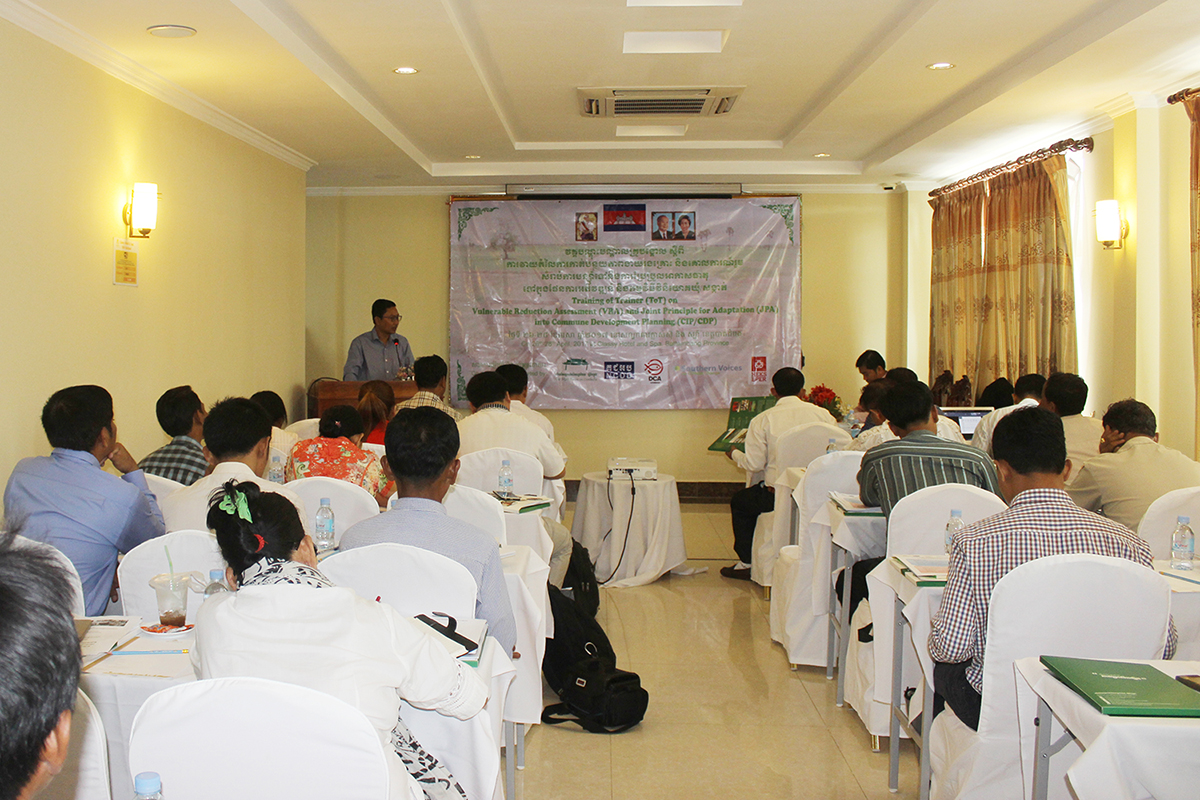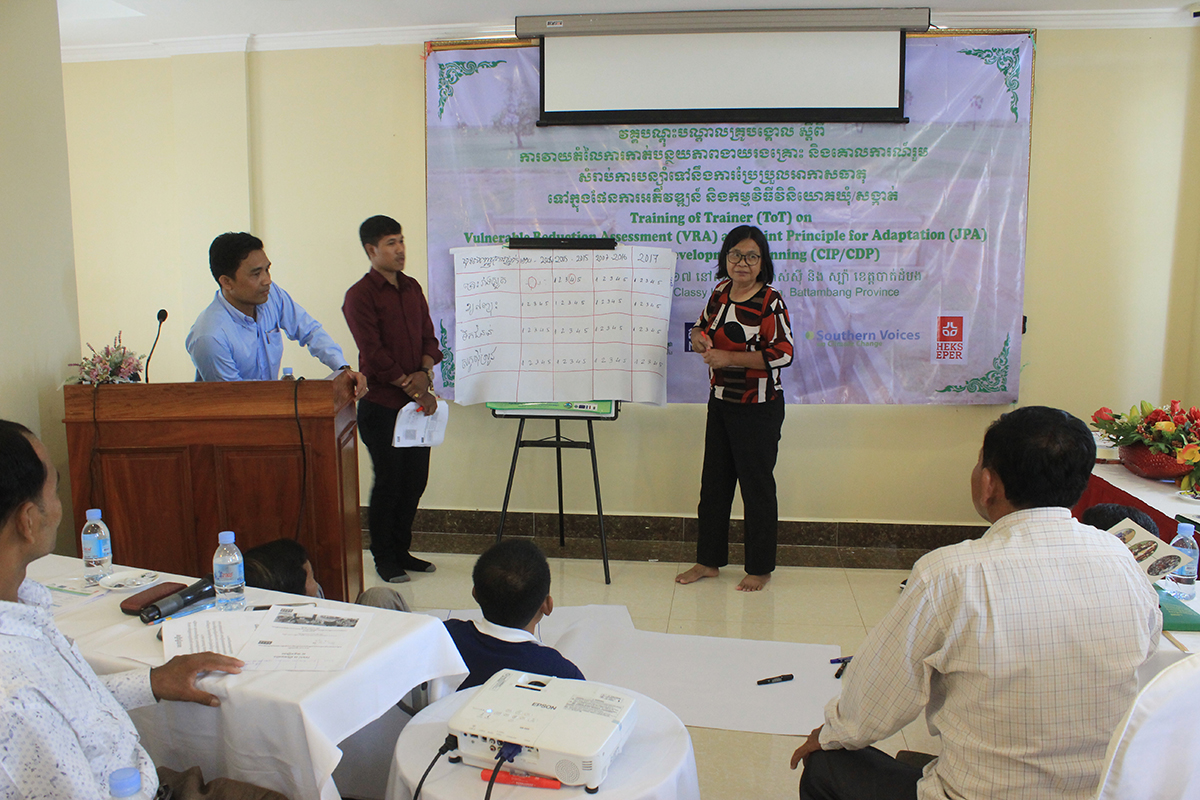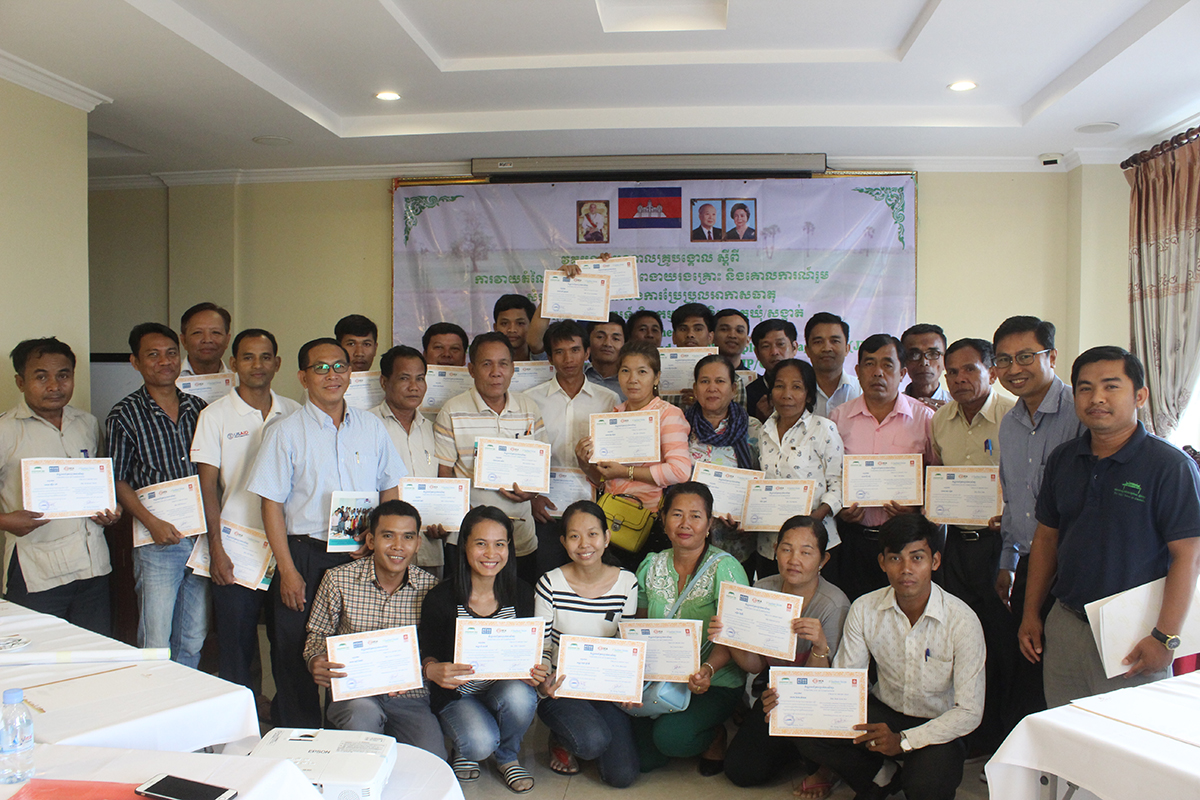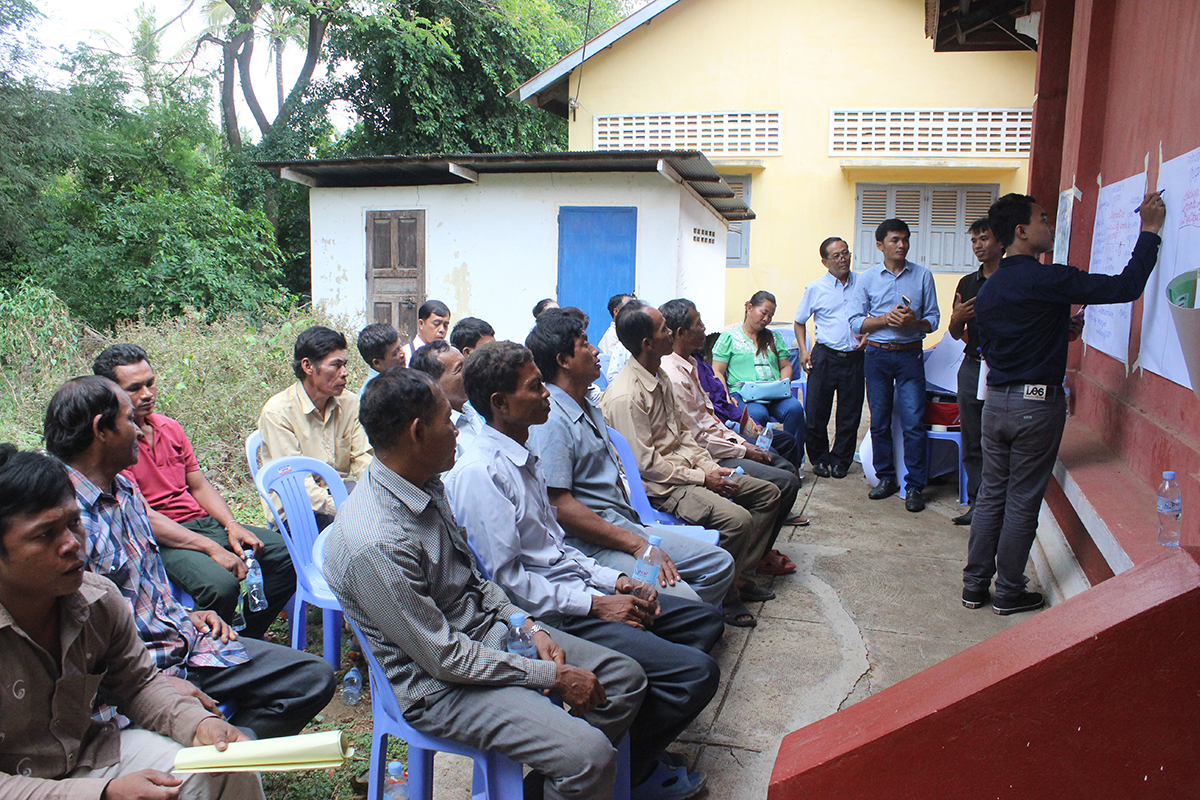
Classy Hotel &Spa, Battambang Province: During this three days training, there are 37 participants from NGOs Environment and Climate Change Alliance (NECA) of The NGOForum on Cambodia (NGOF) and Local Authorities of Battambang, BanteayMeanChey, Kratie, Prey Veng, Rattanak Kiri, Kompong Cham, Takeo, Kompong Thom, KompongSpeu, TbongKhom, Pursat and Phnom Penh joint in Training Of Trainer (ToT) on Vulnerable Reduction Assessment (VRA) and Joint Principle for Adaptation(JPA) into Commune Development Planning (CIP/CDP) aiming 1) to improve capacity and knowledge of NECA members, CBOs, local authorities and concern stakeholders on understanding of the climate change concept and mainstreaming tools including VRA, CDP/CIP formulation process, and JPA 2) to strengthen sub-national engagement to apply concept and principle of climate change mainstreaming tools into their works in address climate change issues. In order to deep understanding, we at last day of workshop had an outdoor field practice the VRA and JPA tools for climate change mainstreaming into CIP/CDP. This activity has conducted with different group such as Women Group, Men Group and Local Authorities Group of AnlongVil Commune, Sangke District, Battambang province.

In welcome session, Mr. Sey Peou; a climate change policy monitoring project coordinator and NECA Secretariat addressed that “This three days has been co-facilitated and co-cooperated by NECA of The NGO Forum on Cambodia (NGOF) and The National Committee for Sub-national Democratic Development (NCDD) andrefer to what we have been agreed in late 2016 in advocacy strategy developing and highlighted that Cambodia’s vulnerability to climate change is widely regarded to be due to its poor adaptive capacity and coping knowledge’s at national and sub-national. 80% of the population lives in rural areas with poor adaptive capacity and infrastructure. The agricultural sector contributes around 34% of GDP and engages 80% of the population. The Second National Communication to the UNFCCC reveals that nearly 50% of the total communes in Cambodia is categorized between vulnerable to extremely vulnerable to climate viability. To address the issue, the mainstreaming for climate change adaptation and disaster risk management into sub-national planning and budgeting has become recognized as increasingly important in building the country’s absorptive capacity and enhancing community resilience to climate impact”.
Based on CSO strategic advocacy, we agreed to achieve the specific objective of at least 60% of NECA’s target areas (17/29 communes) integrate CCA into the CDP/CIP with community participation and appropriate financial support by end of 2017, both top-down and bottom-up strategy approach are complemented with each other. The support of NGOF as well as other related partners such as DCA/CA, UNDP, Plan International, and especially NCDD secretariat as the technical assistants/supervisors who play important role particularly at the national level will be necessary and bring hopeful for NECA members to fulfil their commitment in order to mainstream CCA into CDP/CIP at their target areas set in this advocacy strategy and action plan.
One of milestones; capacity building for NECA members, Commune Committee on CDP/CIP formulation, and CC affected communities on CC related topics including VRA, CDP/CIP formulation process, and JPA (A,B,E) are very important to ensure the CCA mainstreaming into CDP/CIP. Applying both conceptual and practical knowledge at the same time as addressing in the project is a very useful tool to be considered in Cambodia context.

At the end of session; Mr. Peou has a strongly optimistic that the participants will be increased the knowledge, skills and ability to mainstream climate change and disaster into commune investment and development plans and they can transfer the gained knowledge by provide train to another stakeholders such as CBOs, municipal, district, commune and community levels, in order to effective mainstream the climate change and disaster into commune investment and development planning
As climate resilience specialist and resource person in this training, Mr. Kong Chanthan is very welcome and highly appreciates to NECA/NGOF for this great collaboration and contribution to NCDD policy objectives. He added that “CSOs role in community development especially in grass root is very vital through raise awareness, capacity building, technical and financial support in order to empower vulnerable community to build resilience to climate change impacts.
Mr. Chanthan mentioned that “in last Mach 2017; NCDD just launched the climate change mainstreaming guideline. These papers have been developed and consulted with key stakeholders at national and sub-national levels on the tools to ensure the climate change will be integrate into their investment plan and development plan. This guideline will be a roadmap for concerning stakeholders both duty-bearer and right-holders for mainstreaming CCA/DRR into commune development planning effectively” with the oversight of the National Committee for Sustainable Development a former National Climate Change Committee, the Climate Change Department of the Ministry of Environment coordinated to develop the Cambodia Climate Change Strategic Plan (CCCSP) 2014-2023 and introduce the guideline and VRA tool to the local authority and provincial department at sub-national level for learning on the climate change, relevant policies and analysts the venerable are in their real situation area and sectors.
National Program for Sub-National Democratic Development 2010-2019 (NP-SNDD) is another plan of RGC in the sub-national level for the further expansion of the single window mechanism to cover all municipalities, districts and khans, and further promoting broader delegation of powers – which means to give public services to the citizens directly without complicated administration system. As stated in NP-SNDD, RGC’s goals for sub-national democratic development are:
- Create a culture of local participatory democracy, accountable to the citizens
- Improve public services and infrastructures
- Bring about social and economic development
- Contribute to poverty reduction
In a Second Study on Understanding of Public Perception of Climate Change in Cambodia (KAP2) almost all informants said that more properly designed and executed dissemination of information on climate change is required since almost all sub-national and local informants were poorly informed about the causes and consequences of climate change and best adaptation practices. In addition, there is still misunderstanding about roles in sub-national informants. It was still limitation that only the national government has played a leading role in developing strategy and guidelines for implementation at sub-national level.
